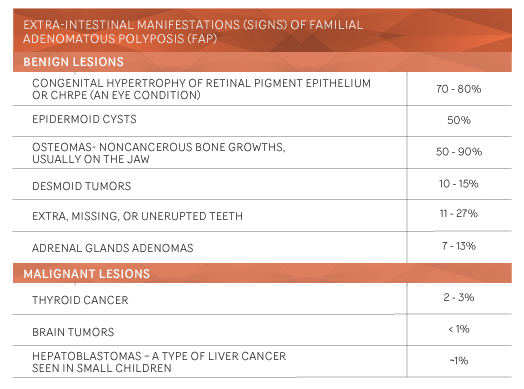Disease risk in FAP
The risk of cancer in individuals with APC mutations is exceptionally high, and effective measures to prevent the disease are crucial.
Almost all of those carrying mutations associated with FAP in the APC gene will develop large numbers of polyps in the intestine (more than 100).
The chance that some will become malignant is almost 100%, and this occurs, on average, around the age of 40.
In FAP the polyps can also appear in the stomach and duodenum. About 90% of patients have polyps in the duodenum, although only a few (4-12%) will degenerate into cancer. Gastric polyps are also common, but rarely lead to cancer.
Besides gastric and duodenal tumors, there is also risk, although a lower one, of other cancers, as well as other health issues (see table).

Extra-intestinal manifestations in FAP
(So those that do not involve the colon, stomach or the small intestine)
Some of these manifestations are of little clinical importance, but they can, however, help in the diagnosis of FAP-affected families.
This is the case, for example with the eye condition CHRPE (Congenital Hypertrophy of the Retinal Pigment Epithelium).
To identify individuals with an APC mutation is crucial to ensure that all their potential future problems are detected and controlled on time.
Talk with your doctor about getting genetic counseling
.
Colorectal cancer is the most probable result of a FAP mutation, so once a high number of polyps is detected, preventive colon removal is advised.
Do not forget:
- Not everyone in a family diagnosed with FAP has the mutation;
- There are several possible options, and specialized medical teams, to help to manage the increased risk of cancer




